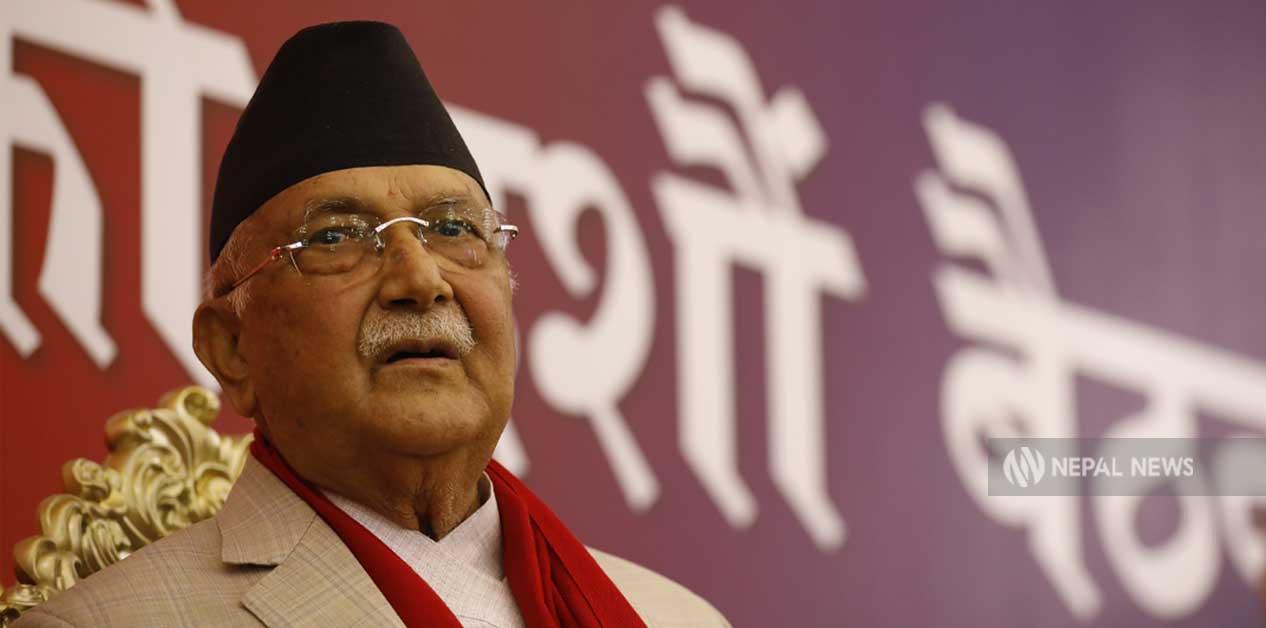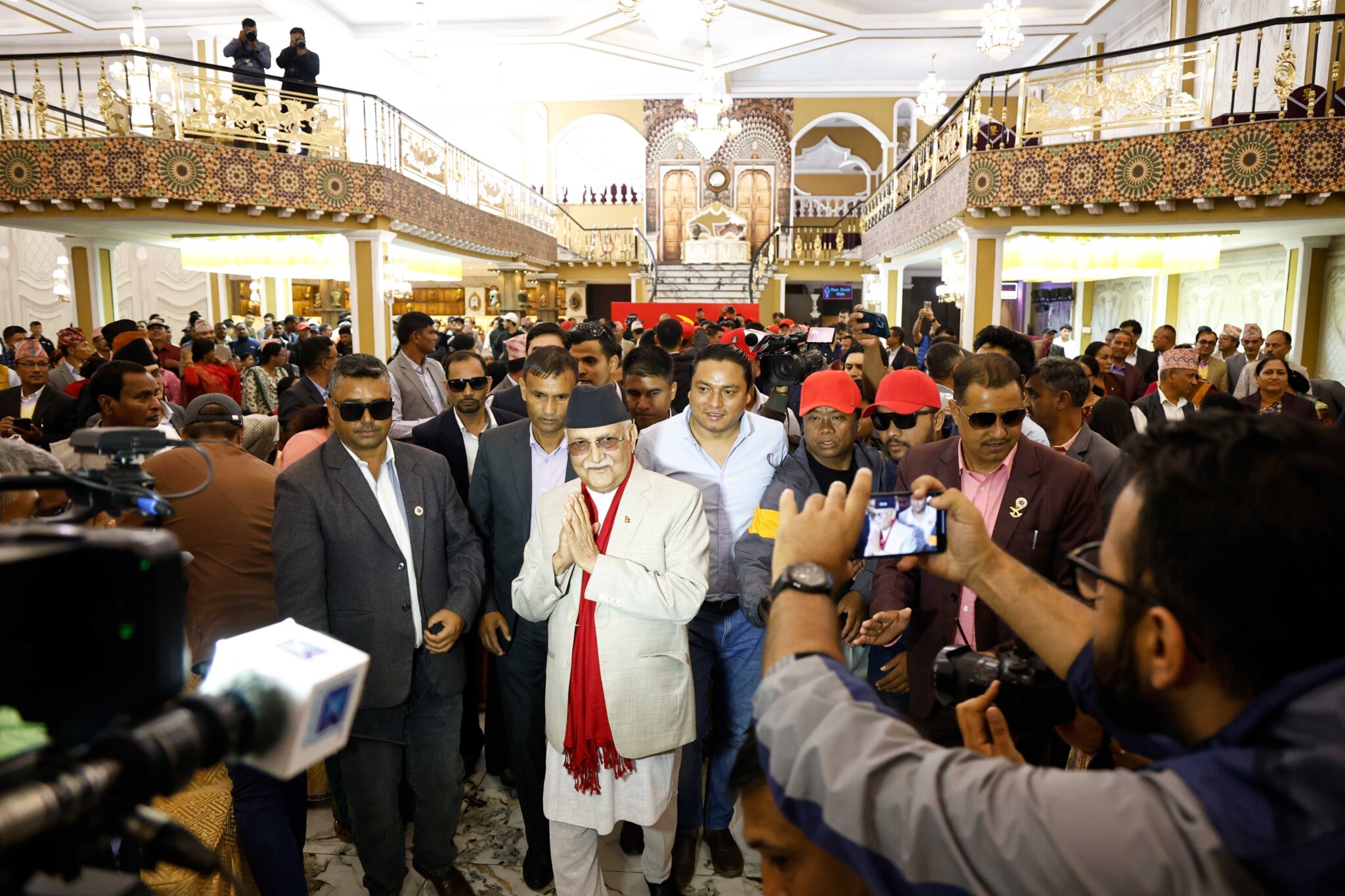
Marked by schemes and betrayals instead of loyalty and sacrifice, Oli’s political path has come full circle to haunt him

KATHMANDU: Although the party has collective leadership, the Communist Party of Nepal (Unified Marxist–Leninist) (CPN (UML) still appears to be operating under the policy of Chairman KP Sharma Oli. He who suffered an unimaginable ousting from power, clearly stating to editors, “You will soon write a special editorial titled ‘The appointment of KP Oli as Prime Minister,'” directly means that he wants to be re-established in power. By forcing the party to make the reinstatement of the parliament its bottom line and deciding not to participate in the election announced for March 5, Oli has also sent the message that his power remains intact.
The Nepali Congress (NC), which was also forced out of power along with the UML, has started internal preparations to participate in the election. It has even called on its cadres not to miss registering on the voter roll.
The Communist Party of Nepal (Maoist Centre) has started the electoral race. The Madhes-based parties have also stated that they will participate in the election. However, Oli, who was shaken by the unexpected and unimaginable Gen Z movement, getting the party to decide against participating in the upcoming election clearly means one of two things: either he wants to sabotage the election, or he is afraid of the election. If the election is sabotaged, how expensive a situation will that create for the country? The question itself is terrifying.
The difficult situation that has arisen due to the party’s shortcomings and the leadership’s stubbornness (a situation where cadres cannot even show their faces to the people or voters in the country’s newest political scenario) has severely squeezed the UML. The thought that the powerful chairman might create a situation like that faced by Bhim Rawal is suppressed in the minds of many leaders and cadres and has not been able to reach their lips. The action taken against Binda Pandey and Usha Kiran Timilsina even when they spoke in the party’s interest has completely exposed the illiberalism within Oli.
Oli was defeated in the first Constituent Assembly election, but that did not make much difference to him.
The Cart Journey
The politics following the 2005/06 People’s Movement were favorable for Oli’s journey to Singha Durbar (the seat of government). However, during that movement, the protestors did not see him much on the streets. Instead, Girija Prasad Koirala, in the latter part of his life, tasted a police baton almost to the point of fainting during the street protests.
While the protestors reached the demand for a republic, Oli was joking, “Demanding a republic is equivalent to traveling to America by oxcart.” However, Oli benefited the most after the People’s Movement. He immediately became deputy prime minister to the then-prime minister, Girija Prasad Koirala, leading the UML.
Oli was defeated in the first Constituent Assembly election, but that did not make much difference to him. However, the then-powerful General Secretary Madhav Kumar Nepal, bound by moral obligation after his defeat, resigned from leadership. Despite being defeated in the election, he entered the Constituent Assembly, as if by ‘fluke,’ with the help of the Maoist party, and even became Prime Minister. But as Oli accumulated power within the party, the power of leader Nepal within the party began to erode.
When Nepal tried to return to party leadership again, Oli, with the help of Bam Dev Gautam, blocked his path. Oli, who became the prime minister with a two-thirds majority after unification with the Maoist party, could not maintain the partnership with Prachanda for long. The court divorced them. Madhav Kumar Nepal left with a small contingent, including Jhala Nath Khanal, and Bam Dev remained like a hermit for a long time. Oli emerged untouched and untouchable.
The same republic, whose possibility and demand Oli joked about as a journey to America via oxcart, enabled him to travel to Singha Durbar four times.
During this period, Oli alienated many people. From the beginning, he was illiberal towards the demands of the Indigenous Nationalities and Madhesi communities. Even while holding the position of prime minister, he challenged mayors like Balen Shah and Harka Sampang. Those towards whom he was illiberal are now in great joy over his forceful ousting from power. Because of his nature and speech, many nationalist and public welfare works carried out under his leadership were overshadowed.

Chairman KP Sharma Oli at the 10th Central Committee meeting of CPN-UML. Photo: Bikram Rai/Nepal News
Rising Spate of Self-Harm
How did infiltration happen within the Gen Z movement? The curtain on this mysterious aspect may open in the future. The damage caused by the burning of the country’s executive, judiciary, and legislature buildings, along with the documents inside, is irreparable. Hotels were burned; how do we attract tourists now? Various countries have tightened visa restrictions; how do we bring in remittances? The fire that engulfed industries and commercial buildings cost many their jobs. How do we revive them now? The Constitution, which is an even more expensive asset, is in a coma; how do we save it? 76 people died, and many were injured and disabled; how do we console them and their families? Weapons have been looted, and fierce criminals have escaped from jail; how do we guarantee security?
Due to the fact that he was in power at the time of the incidents, these questions are morally directed at Oli. Because he is the factor behind them.
When social media became an indispensable technology for Nepalis, Oli did not conduct mature groundwork when attempting to regulate it. He considered the Gen Z youths as ‘kids.’ No attempt was made to call them for talks and reason with them. Ultimately, unfortunate and mysterious scenes unfolded one after another. Shutting down social media proved to be a self-goal for Oli.
Once, when Baburam Bhattarai gave a speech saying he was ready to sacrifice himself for the country like Bhimsen Thapa, cultural expert Ramesh Kumar Dhungel wrote a long article thoroughly explaining the dictatorial character of Bhimsen Thapa to Bhattarai.
Two incidents confirm that Oli had an intense desire to be like Bhimsen Thapa. He showed haste in engraving his name on the inscription of the Dharahara tower even before its reconstruction (after being toppled by the 2015 earthquake) was complete. On the other hand, the View Tower built in his hometown, Damak, also signals his desire to be Bhimsen.
His journey towards singular dictatorship, disregarding other party leaders and even coalition partners, eventually proved to be a political self-goal.
When social media became an indispensable technology for Nepalis, Oli did not conduct mature groundwork when attempting to regulate it.
In fact, he had set the path for self-goals much earlier. The way Oli supported Rajendra Lingden in Jhapa to defeat leader Krishna Prasad Sitaula, who played a crucial role in establishing the federal democratic republic in the country, also ultimately proved to be a self-goal. The second time Lingden entered the parliament building, in collaboration with Oli, he was not alone as before; he entered powerfully with many other colleagues. And in parliament, they started demanding the reinstatement of the monarchy.
The emergence of Durga Prasai was due to Oli’s habit of trying to subdue sometimes one person and sometimes another. Oli made Prasai a party leader. When Prasai realized that his objectives would not be fulfilled within the UML, he increased contact with Nirmal Niwas (the former Royal Palace).
Another person who got an opportunity to achieve a high position because Oli gave him the chance is Jagman Gurung. There was no shortage of cultural workers in the UML who had worked tirelessly on cultural fronts to raise political awareness in the country and bring the party to its current state. But Oli appointed Jagman as the Vice-Chancellor of the Nepal Academy. Immediately after his tenure ended, Jagman appeared on the streets demanding the king’s return. After Nawaraj Subedi was placed under house arrest, Gurung became the acting leader of that movement. Oli has committed many such self-goals in his political life.
‘Refusing When Given, Licking Boots at Night’
During the Gen Z movement, when his life was at risk, he hurriedly signed a piece of paper, resigned from his post, and boarded an army helicopter. It is clear that his resignation came in the course of the country’s political resolution, and a new government was formed. Demanding the reinstatement of the parliament and litigating the matter in court is certainly within his rights. However, he himself is established as the person who repeatedly recommended the dissolution of parliament in the past. The people will naturally question him about wanting dissolution yesterday and raising the issue of reinstatement today. Therefore, it would be beneficial for the UML members to quietly present their views to the people and come back with public approval.
Another incident concerning Oli seems relevant here. In the UML’s Sixth General Convention held in Nepalgunj in 1998, Bam Dev Gautam presented views under the title “Progressive Reform,” and Oli under the title “Power Accumulation.” However, the General Convention rejected Gautam. According to the then-practice of the UML, the defeated side was supposed to nominate members to the Central Committee based on the percentage of votes they received. Previously, when defeated by Madan Bhandari’s ideology, CP Mainali received 13 percent of the Central Committee members.
At that time, the chairman and general secretary were elected, and the UML’s committee was not multi-officer as it is now. The UML had abolished the post of chairman after the death of Manmohan Adhikari. However, Bam Dev did not send the names of leaders for the share allocated to him. At that time, Oli took a jibe at Bam Dev, commenting, “Refusing when given, licking boots at night” (a Nepali proverb meaning rejecting something openly only to try and get it secretly later). Ultimately, Bam Dev split the party, making Sahana Pradhan the chairman and taking CP and Radha Krishna Mainali with him.
Today, the election has been announced, and Oli is saying he will not participate in the election. Does his decision not also resonate with the saying, “Refusing when given, licking the boots at night”?